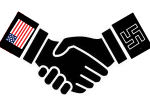


Much of the truth and significance of the presidencies of FDR and JFK has been buried by mainstream and supposedly progressive and left newsmedia. In 1991, Oliver Stone began to rectify this when when he released the film JFK. JFK was based on the book On the Trail of the Assassins by the Attorney of the District of New Orleans Jim Garrison (1921-1992).
In spite of the efforts to bury the truth, Oliver Stone has persisted with his priceless work. The latest is his TV documentary and accompanying book The Untold History of the United States of 2012.
Even though JFK was tragically murdered by agents of the military-industrial complex only 900 days after his inauguration, his election and, before him, the election of Franklin Delano Roosevelt (FDR) show that, for all the flaws and corruption of western parliamentary democracy, it can be made to work. When it works, decent, caring and capable people like JFK and FDR can be elected to high office.
Whilst I have not yet read the chapter on JFK (but have seen his movie of 1991), his earlier chapter on FDR is a stunning revelation of President Roosevelt and the New Deal by which he revived the US economy from the Great Depression in the face of advice by the neoliberal economists of his day. (The same neoliberal economic doctrine has been implemented since 1983 by the 'Labor' governments of Bob Hawke and Paul Keating Government in Australia and in the UK by Margaret Thatcher and by the 'Labor' UK government of Tony Blair.)
Untold History, with extraordinary insight and knowledge gives the best analysis I have yet read of what was at stake during that terrible Second World War in which as many as 70 million may have died. Whilst FDR's manouevres to overcome the aversion felt by the overwhelming majority of Americans to entry into another bloody European war may have appeared Machiavellian, Stone shows that the survival of human civilisation in the face of Nazism and Japanese imperialism was at stake and that therefore FDR's actions were right.
Sadly FDR died in 1944 before the war was won and before he could have ensured a just and enduring peace. As a result of misfortune and undemocratic manoeuvres by Democratic Party apparatchiks, Roosevelt was succeeded by the uninspired and malleable Harry Truman in place of Henry Wallace, who most had assumed would become the next President.
Stone shows conclusively with the testimonies of a large number of generals and politicians, that the dropping of even the first Atom bomb on Hiroshima, let alone the second Atom bomb on Nagisaki, was unnecessary to get the Japanese to surrender. The Japanese were defeated because of a naval blockade, conventional bombing and defeat in the Pacific and Asian land war, and they knew it, and had sent out numerous peace feelers. On top of that Russia had planned to attack Japan in Manchuria as agreed to at Yalta in May 1945.
Nonetheless Truman was manoeuvred by forces opposed to peace. within the Democratic Party, corporate bosses and government bureaucrats, to order the dropping of the two Atomic bombs and to start the Cold War with America's former Soviet allies.
President Kennedy did much to reduce the threat of war which had been boosted by Truman's and Eisenhower's presidencies. Sadly, he was murdered and so was unable to prevent the escalation of the Vietnam war or to conclusively end the nuclear arms race.
Today, 29 May 2013, marks 96 years since the birth of John Fitzgerald Kennedy (JFK) in the 50th anniversary year of his assassination. JFK grew up to show astonishing bravery, firstly in the Second World War as commander of PT109 in the Solomon Islands to the north of Australia and secondly as President of the United States, where he tried to bring about international and domestic justice and to prevent the outbreak of nuclear war.
 Anti-war activists usually rightly oppose military aggression by the United States and its allies. Currently, however, many support US-NATO against Russia, in what has been labeled by the corporate newsmedia as unjustified and unprovoked Russian aggression against the sovereign nation of Ukraine.
Anti-war activists usually rightly oppose military aggression by the United States and its allies. Currently, however, many support US-NATO against Russia, in what has been labeled by the corporate newsmedia as unjustified and unprovoked Russian aggression against the sovereign nation of Ukraine.




Recent comments